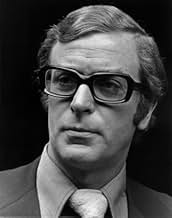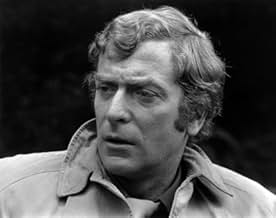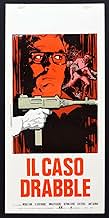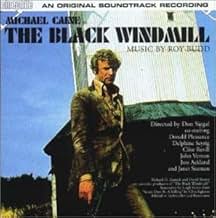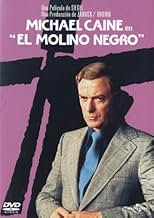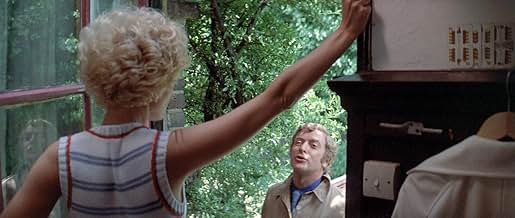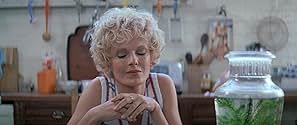IMDb RATING
6.3/10
3.6K
YOUR RATING
A British agent's son is kidnapped and held for ransom.A British agent's son is kidnapped and held for ransom.A British agent's son is kidnapped and held for ransom.
- Director
- Writers
- All cast & crew
- Production, box office & more at IMDbPro
Featured reviews
In 1965, Caine created the role of Harry Palmer in the Ipcress File. It was good enough to spawn two follow-ups: Funeral in Berlin and the Billion Dollar Brain. By 1974, the movie-going public was used to seeing him in the role of a secret agent. Here he gets in trouble, and although you know that by the end of the film he will emerge victorious, or will he? I'm not telling. But the excruciating fun is in trying to figure our what will happen next. Filmed in Europe, Black Windmill" is directed by Don Siegel. Clint Eastwood credits Don for his success as a director, and, of course, Siegel also directed some of Clint's best movies. The pacing is even throughout and builds to a suspenseful climax. Let it not be overlooked that Donald Pleasence in a supporting role is at his usual best. The human chameleon that adapts beautifully to whatever role is given him. John Vernon is especially menacing. To me, seeing old movies a second or third time is like visiting with old friends. Everybody has their own "Casablanca" and "Shawshank Redemption." If you haven't seen this one yet, please do. It will become one of your "old friends" which I'm sure you will visit again and again.
I've read several comments that point out the clumbsiness of the action editing in "The Black Windmill." I think what is being overlooked is that what we have been seeing for the past thirty years on tv and video has been a pan-and-scan version of a Panavision film. The action was designed for a widescreen and we've only been seeing half of it, sloppily panned-and-scanned, making it seem jumbled. I believe that the widescreen dvd release will prove me right.
Admittedly, in terms of Siegel action-drama quality,this flick falls in the middle ground between the great "Dirty Harry" and the so-so "Telefon." But even the low-budget Telefon is much more exciting in its original wide aspect ratio than in "full" screen.
Admittedly, in terms of Siegel action-drama quality,this flick falls in the middle ground between the great "Dirty Harry" and the so-so "Telefon." But even the low-budget Telefon is much more exciting in its original wide aspect ratio than in "full" screen.
Every now and again you come across a film that's somewhat a letdown, even when those expectations are kept at bay. Don Siegel's mid-70s espionage-thriller 'The Black Windmill' that starred Michael Caine falls in that category. If anything it was that title (which the story is adapted off Clive Egleton's novel "Seven Days to a Killing") which caught my eye. Siegel's adapt, controlled workhorse direction tackles the subdued material with little suspense, but constructing something tight, sullen and dry with the main focus on building something out of its elaborately knotty (but dubious) premise. It's a true pot-boiler entangled with twists. While the material is stimulating (with some good work by the solid support performances and an occasionally witty line) and the sturdy set-pieces are competently crafted, however the pacing is too blotchy and in the end it builds to really nothing. It loses some weight due to the lack of suspense and urgency with a crackerjack climax that's just too quick. Michael Caine's composed performance is strongly delivered, and John Vernon makes for an ideally icy and conniving villain. Donald Pleasance is delightfully squirmy (which his character likes to really fiddle with that moustache) and Janet Suzman provides some fire. Delphine Seyrig and Clive Revill offer able support too. Roy Budd's sizzling, but low-key music score works well and Ousama Rawi lenses it with a great illustrative eye. Siegel's touch is evident in both of those devices. An unexceptional feature, but still its well organised and performed.
I caught this film when it was shown on British television recently and was surprised that I had never previously heard of it, despite the fact that it stars an actor as iconic as Michael Caine and was made by a director as famous as Don Siegel. The "black windmill" of the title is one of the two Clayton Windmills (known locally as "Jack and Jill") on the South Downs near Brighton; this windmill plays an important part in the plot.
As in "The Ipcress File", Caine plays a British secret service agent, but his character here, John Tarrant, is very different to Harry Palmer. Whereas Palmer was a working-class outsider, a former Army sergeant who was virtually blackmailed into joining the secret service to avoid a criminal charge, Tarrant is an establishment insider, part of the officer class. (He holds the rank of Major). He is engaged in an undercover operation to counter the activities of a gang of arms smugglers selling weapons to terrorists in Northern Ireland. (The film was made in 1974 when the Northern Irish troubles were at their height).
The film starts with Tarrant's young son David being kidnapped and held to ransom. The kidnappers appear to have a detailed knowledge not only of Tarrant's family circumstances but also of the work he is engaged on; as their ransom they demand a valuable quantity of uncut diamonds which he has recently acquired to fund his intelligence work. Tarrant initially believes that the kidnappers are connected either to the arms dealers or to the terrorists for whom they are working, and confides in his superior, Cedric Harper. As matters progress, however, he begins to wonder whether matters are really as they seem and whether he can really trust his colleagues.
This is far from being Caine's worst film. (For an actor of his distinction he made more than his fair share of dreadful ones, "Blame It on Rio" and "Ashanti" being two that come to mind). It does, however, highlight one of his weaknesses as an actor, namely that in the early part of his career he was not very good at conveying strong emotions. Most of his iconic roles, at least from this period, involved him playing characters who, for one reason or another, avoid showing much emotion. This could be because they need to keep up the "stiff upper lip" (his characters in "Zulu" and "Battle of Britain"), because they hide their feelings beneath a mask of impassivity (Jack Carter), because they deliberately avoid emotional commitment (Alfie Elkins) or because they try and distance themselves from their feelings through cynicism and irony (Frank in "Educating Rita"). Certainly, some of his more mature performances do show greater emotional depth, such as "The Honorary Consul" and "The Quiet American", but in "The Black Windmill" he is rather wooden, never suggesting the anguish and anxiety of a man whose son is being held for ransom.
Some of the acting is better; Janet Suzman as Tarrant's estranged wife Alex provides the emotional conviction that Caine's performance lacks, while Donald Pleasence is very effective as the smooth but unsympathetic and possibly duplicitous Harper. The film as a whole is a professionally made thriller, if not a very original one, but an essentially American director like Siegel was not the most natural choice to direct a British spy thriller like this one. "The Black Windmill" is never going to rank on his filmography as highly as the likes of "Dirty Harry" and "The Shootist". 6/10
As in "The Ipcress File", Caine plays a British secret service agent, but his character here, John Tarrant, is very different to Harry Palmer. Whereas Palmer was a working-class outsider, a former Army sergeant who was virtually blackmailed into joining the secret service to avoid a criminal charge, Tarrant is an establishment insider, part of the officer class. (He holds the rank of Major). He is engaged in an undercover operation to counter the activities of a gang of arms smugglers selling weapons to terrorists in Northern Ireland. (The film was made in 1974 when the Northern Irish troubles were at their height).
The film starts with Tarrant's young son David being kidnapped and held to ransom. The kidnappers appear to have a detailed knowledge not only of Tarrant's family circumstances but also of the work he is engaged on; as their ransom they demand a valuable quantity of uncut diamonds which he has recently acquired to fund his intelligence work. Tarrant initially believes that the kidnappers are connected either to the arms dealers or to the terrorists for whom they are working, and confides in his superior, Cedric Harper. As matters progress, however, he begins to wonder whether matters are really as they seem and whether he can really trust his colleagues.
This is far from being Caine's worst film. (For an actor of his distinction he made more than his fair share of dreadful ones, "Blame It on Rio" and "Ashanti" being two that come to mind). It does, however, highlight one of his weaknesses as an actor, namely that in the early part of his career he was not very good at conveying strong emotions. Most of his iconic roles, at least from this period, involved him playing characters who, for one reason or another, avoid showing much emotion. This could be because they need to keep up the "stiff upper lip" (his characters in "Zulu" and "Battle of Britain"), because they hide their feelings beneath a mask of impassivity (Jack Carter), because they deliberately avoid emotional commitment (Alfie Elkins) or because they try and distance themselves from their feelings through cynicism and irony (Frank in "Educating Rita"). Certainly, some of his more mature performances do show greater emotional depth, such as "The Honorary Consul" and "The Quiet American", but in "The Black Windmill" he is rather wooden, never suggesting the anguish and anxiety of a man whose son is being held for ransom.
Some of the acting is better; Janet Suzman as Tarrant's estranged wife Alex provides the emotional conviction that Caine's performance lacks, while Donald Pleasence is very effective as the smooth but unsympathetic and possibly duplicitous Harper. The film as a whole is a professionally made thriller, if not a very original one, but an essentially American director like Siegel was not the most natural choice to direct a British spy thriller like this one. "The Black Windmill" is never going to rank on his filmography as highly as the likes of "Dirty Harry" and "The Shootist". 6/10
I just bought and watched the new blu ray of this,and greatly enjoyed it.
I have seen this film before but only on late at night on tv when I was half asleep and the commercials and the pan and scan ruined it for me.
When I concentrated on watching it on wide screen and with interruptions it seems a much better film than its weak reputation.
Perhaps viewers expected more action from the director of Dirty Harry.
The action in the film is fine but it is smarter than just an action film.
So if you are spy or Caine fan or just like good acting seek this film out.
The film has lots of good actors in small parts and the script is good.
But the viewer has to stay alert to enjoy the film.
Now somebody tell me why the same director's Telefon is not on blu ray.
I have seen this film before but only on late at night on tv when I was half asleep and the commercials and the pan and scan ruined it for me.
When I concentrated on watching it on wide screen and with interruptions it seems a much better film than its weak reputation.
Perhaps viewers expected more action from the director of Dirty Harry.
The action in the film is fine but it is smarter than just an action film.
So if you are spy or Caine fan or just like good acting seek this film out.
The film has lots of good actors in small parts and the script is good.
But the viewer has to stay alert to enjoy the film.
Now somebody tell me why the same director's Telefon is not on blu ray.
Did you know
- TriviaDonald Pleasence came up with the idea for his character to constantly use a hankie.
- GoofsIn the roof garden where Tarrant's wife sends the toy fire engine down the slide towards him, as Tarrant turns to re-enter the house, the reflection of the boom mic can briefly be seen in the glass doors behind.
- Quotes
Cedric Harper: He knew my name and he knew the name of this department. Both of these things imply serious breaches of security.
- Crazy creditsThe opening credits are formed from images of children's alphabet blocks.
- ConnectionsReferences La Mélodie du bonheur (1965)
- SoundtracksUnderneath the Spreading Chestnut Tree
(uncredited)
(trad.)
- How long is The Black Windmill?Powered by Alexa
Details
Box office
- Budget
- $1,500,000 (estimated)
Contribute to this page
Suggest an edit or add missing content

Top Gap
By what name was Contre une poignée de diamants (1974) officially released in India in English?
Answer

